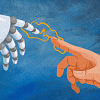Hear us out, e-books are the future

E-readers, or electronic readers, have become increasingly popular in recent years for reading books, magazines, and other forms of literature. They offer a number of benefits over traditional physical books, making them a better choice for many readers.
One of the main advantages of e-readers is their portability. A typical e-reader is about the size of a small tablet and weighs only a few ounces, making it easy to carry around in a purse, backpack, or briefcase. In contrast, physical books can be bulky and heavy, especially if you have a large collection. E-readers allow you to take all your books with you wherever you go, without having to worry about weight or space constraints.
Another benefit of e-readers is the convenience they offer. With an e-reader, you can easily purchase and download new books at any time, without having to physically go to a bookstore or wait for a shipment to arrive. Many e-readers also offer a variety of features, such as adjustable text size and background colour, making it easier to read in different lighting conditions. In addition, e-readers often have a built-in dictionary and other language tools, allowing you to quickly look up definitions or translations as you read.
E-readers are also more environmentally friendly than physical books. According to a study by the International Association of Scientific, Technical, and Medical Publishers, the production of one e-reader has a carbon footprint that is about 75% smaller than the production of just one physical book. In addition, e-readers use less paper and other resources, as all the books are stored electronically. This can help reduce waste and deforestation, making e-readers a more sustainable choice.
E-readers also offer greater accessibility for people with disabilities. Many e-readers have features such as text-to-speech, which allows users to have the book read aloud to them. This can be especially helpful for people with vision impairments or dyslexia. In addition, e-readers can often be used with assistive technology, such as braille displays or speech recognition software. This can make it easier for people with disabilities to access and enjoy literature.
Despite these advantages, some readers prefer physical books due to their nostalgia or the feeling of holding a tangible object. However, it is worth noting that e-readers have come a long way in recent years and can now mimic the experience of reading a physical book in many ways. Many e-readers now have a paper-like display that reduces glare and feels similar to reading on actual paper. Some e-readers even have the option to add a physical book cover, which can help create a similar tactile experience.
Despite all the arguments, it is true that in Bangladesh, e-readers or e-books are far from being the norm. Although the modern reader is more likely to pick up an e-book rather than a physical book, one of the primary reasons for the lack of an ebook-friendly ecosystem in Bengali literature is the absence of a reliable and accessible digital infrastructure. Unlike other regions with well-developed technology industries, the digital landscape in the country is relatively underdeveloped, which has made it challenging to create and distribute ebooks seamlessly and efficiently. This lack of infrastructure has resulted in a lack of investment in the development of ebook publishing platforms, digital libraries, and other tools that are necessary for the growth of the digital literary ecosystem.
The lack of a supportive ebook environment in Bengali literature has had far-reaching consequences for authors, publishers, and readers alike. For authors, the absence of a digital infrastructure and cultural support for ebooks has made it challenging to reach a wider audience and monetise their works. This has resulted in a decline in the number of authors choosing to publish their works in digital format and a decline in the quality of digital literature being produced.
For publishers, the lack of investment in the development of the digital literary ecosystem has limited their ability to reach new readers and monetise their works. This has resulted in a decline in the number of publishers willing to invest in the production of ebooks and a decline in the quality of digital literature being produced.
E-books are rapidly changing the way people consume literature. With their ease of access and portability, ebooks have become the preferred choice for many readers. And it is highly likely that the future of the publishing industry will depend heavily on its digitisation.

 For all latest news, follow The Daily Star's Google News channel.
For all latest news, follow The Daily Star's Google News channel. 








Comments